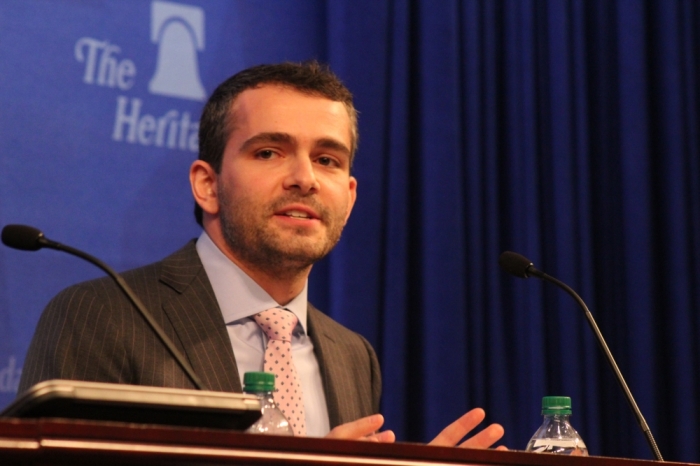Child's Right to Have a Relationship With Both Mother and Father Totally Ignored by Supreme Court, Ryan Anderson Proclaims

WASHINGTON — While composing the 30-page majority opinion in last Friday's U.S. Supreme Court 5-4 ruling that it's unconstitutional for states to ban same-sex marriages, Justice Anthony Kennedy ignored the rights of children to have both a mother and a father, Heritage Foundation senior fellow Ryan Anderson argued Tuesday.
Anderson, who authored a not-yet-released book in response to the court's decision titled Truth Overruled: The Future of Marriage and Religious Freedom, spoke on a Heritage Foundation panel and asserted that 78-year-old "swing vote" Kennedy overlooked the very reason states are involved in marriage in the first place — to ensure parental stability for children.
Anderson cited George Mason University law professor Helen Alvaré, who dissected Kennedy's opinion word-for-word, and stated that the words Kennedy used to justify his opinion had more to do with the rights of individuals to define who they are rather than the rights of children to benefit from the advantages of growing up in a traditional family setting.
"She says, the Supreme Court rules instead that marriage is about adults defining and expressing their identities," Anderson stated. "Adults desire for 'nobility, fulfillment, aspirations, autonomy, self-definition,' the avoiding of 'loneliness' and desire for 'companionship and understanding.'"
"Nowhere in the opinion at all is there any discussion about a child's right for a relationship with both her mother and a father," Anderson continued. "The central defining feature of what got government in the marriage business in the first place — to make sure that men and women commit to each other permanently and exclusively as husband and wife so that children have a mom and a dad — totally ignored in Kennedy's opinion."
Anderson further adds that Kennedy never entertained the child-rearing arguments that were made by lawyers defending states' rights to define marriage and the number of amicus briefs that were filed by adults raised by same-sex parents, which detail the emotional distress that being raised by two mothers or two fathers had on their childhood.
"He never seriously engaged in any of the arguments that [attorneys] were making," Anderson contended. "[He] didn't engage amicus briefs that people like me filed, didn't engage at all."
Kennedy's opinion included one "throw-away paragraph" that touched on the child-rearing argument, which labeled the argument as simply "counterintuitive."
"That argument, however, rests on a counterintuitive view of opposite-sex couple's decision-making processes regarding marriage and parenthood," Kennedy's opinion reads. "Decisions about whether to marry and raise children are based on many personal, romantic, and practical considerations; and it is unrealistic to conclude that an opposite-sex couple would choose not to marry simply because same-sex couples may do so."
In response to Kennedy's counterintuitive claim, Anderson pointed to the impact that the rise of no-fault divorce had on American families and implied that the rise of same-sex marriage will have a similar effect.
"Through no-fault divorce you could file for divorce for any reason at all, in fact, for no reason." Anderson said. "You don't have to cite grounds for divorce and we saw the divorce rate more than doubled because ideas have consequences and bad ideas have bad consequences."
To illustrate his point that children need both a mother and a father to have the best chance of living a happy life, he pointed to the difference in quality of living among children raised in different neighborhoods Washington D.C.
"So, what happens now? Take Washington D.C. for example. The children that live in Georgetown are by and large born into married families and raised into adulthood by their married mothers and fathers," Anderson said. "Children in Anacostia aren't as fortunate, they are by and large born to single mothers and have absent fathers."
Anderson asserted that Kennedy's opinion is based off his own opinions of what marriage is and did not derive his opinion for the Constitution. He added that Kennedy's opinion is a result of 50 years worth of breaking down the American family structure and the rise of the sexual revolution.
"Justice Kennedy's philosophy of marriage is the natural result, the logical result of the past 50 years of the breakdown of the married family. It's the natural, logical conclusion of the sexual revolution," Anderson said.
"It's only a culture that has had a spike in non-marital childbearing, the explosion of no-fault divorce laws, now in all 50 states, that has fundamentally misunderstood the nature of the family and sexuality that 50 years later that would even contemplate legally redefining what marriage is, let alone having five unelected judges redefine marriage for the entire country."





























